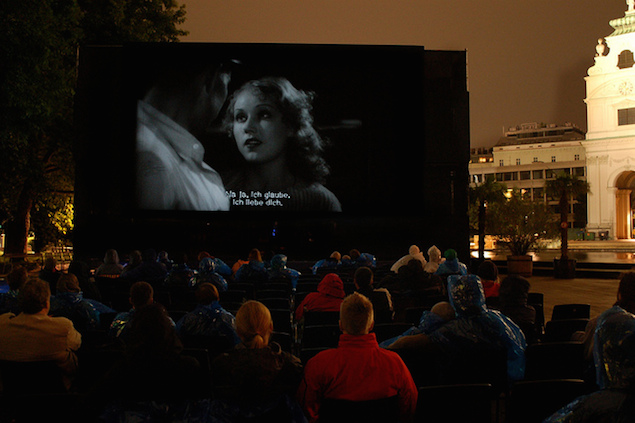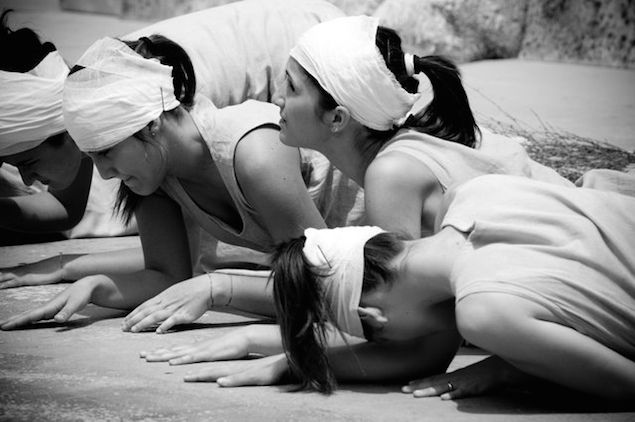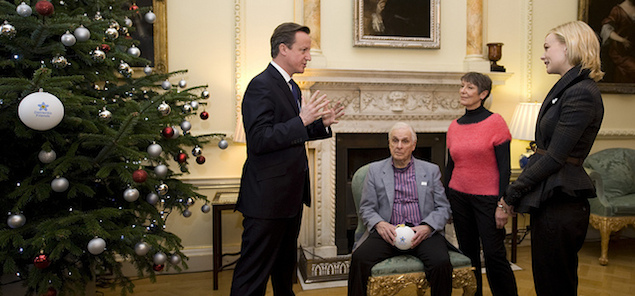Work • Utopia
Utopian Film
Cinema is the most prestigious cultural activity in the modern world. It is for us what theatre was in the age of Shakespeare or painting was in the days of Leonardo da Vinci: the art form with the biggest impact, the largest budgets, the most widespread audiences.
© Flickr/Hamed Masoumi
Collectively, we recognise that film has an astonishing power to induce emotion: it can reliably make millions of us weep, feel terror or relief, be elevated or downcast. It is a massive engine for getting and holding our attention.
But it would sound very weird to stop and ask what film was really for, what purpose it serves in our societies and why we spend so much time in its presence. That’s because we don’t generally think of films as serving any very strenuous or serious cause. We might point out that films aim to be great entertainment, make money at the box office and – occasionally – present us with a controversial idea. We ask for a lot of nice but not terribly consequential things of films: to while away the hours of an intercontinental flight, to keep the family together on the sofa, to give us a bit of a thrill…
© Flickr/Kino unter Sternen
This is reflected in the way we typically categorise films according to nothing more profound than the basic premise of their storylines (adventure, fantasy, disaster, road, sci-fi etc.) or according to the general emotions they produce: comedy, horror, romance. Or we take note of the kind of audiences at which they seem aimed: chick flick, guys’ films, women’s weepers, family-oriented…
All this is a great loss for us and for cinema itself. Watching films has become so profoundly familiar in our society, we have lost sight of just how strange, remarkable and consequential this activity truly is. We have come to take cinema so for granted, we don’t wonder how we might use it to benefit our lives in a properly profound way. Ideally, we would get more ambitious about the role of cinema in the world. We would try to pin down more accurately what films can actually do for us, then make sure we’re reliably making, and finding our way to seeing, the best (that is, the most useful) kinds of films: the films that really do help us with our struggles and pains. We would, ideally, learn that film – like all the other art forms – best reveals its power when we conceive of it as a kind of therapy.
This idea isn’t new. It comes from the Ancient Greeks who brought maturity to the predecessor of cinema: theatre. Fascinatingly, they didn’t just file going to the theatre under ‘entertainment’ and leave it at that. They thought very deeply about what the point of sitting in a theatre might be and concluded that it should be a therapeía, a resource to help us grow into better, wiser, more mature kinds of people. It belonged, together with religion and philosophy, to the forces that could develop our souls. Aristotle proposed that watching tragedies was highly useful in shaking us free of self-righteousness. Seeing how easily a hero might make a small error and then pay a huge price for it could induce fear and pity in the audience, leaving us readier to forgive others and better able to examine our own consciences.
© Flickr/Marco Garro
When it comes to film, we should get back to the practical spirit of the Ancient Greeks. We too should learn to assign functions to films according to their specific capacities. Films have it in their power to compensate us for a range of weaknesses in our nature.
Let’s consider six key problems – and how films might be of help:
Problem One: We take our troubles too seriously
We are understandably prone to self-pity; we get ground down and frustrated by the problems life throws at us. And we tend to react by insisting in ever more rigid and solemn ways on the necessary correctness of our own outlook. We can be hard to live with, lonely, defensive, proud and brittle inside.

© Rex/Kino International/Everett
Certain films can beautifully address this natural tendency when they show us people not too different from ourselves in difficult situations which feel rather familiar. It’s someone a bit like us who is dealing with spouses, the challenges of dating, money worries, travelling for business, health anxieties, bosses, children, in-laws… Except, very much unlike us, a film can play these for laughs. It seeks the absurd side of the exact things we normally greet with excessive seriousness. The film attempts to do something wonderfully useful (and very hard): teach us to laugh at ourselves and restore perspective to our troubles.
At their best, there’s nothing trivial about these comedies at all. They take on the momentous task of sweetly edging us towards being slightly nicer to live around.
Problem Two: We’re not careful enough
It’s a terrible, occasional trauma of life that some actions that seem quite small go on to have horrible consequences. You tell a little lie. You steal a tiny bit. You’re a bit dishonest with someone. You get a bit lustful and carried away, just once… And then, from this, problems can grow and spiral into catastrophe.
Films can help us by speeding up time and showing us in a matter of hours the fearsome result of what we might originally have thought of as small failings. A film can push the consequences to the maximum: it shows what happens when trust is eroded in a relationship, when an enemy is vindictively crushed (rather than spared), when one tries to deny something another person knows…

© Rex/Moviestore
The film can provide us not only with alarm bells. By witnessing horror and disaster, it can make us want to be the kind of person who is a touch more forthright, a little more honest and moral, readier to face an unpleasant moment now and (thereby) head off a distant disaster. We leave the cinema less inclined to be self-righteous about the failings of others, scared for ourselves and more respectful towards things we hold dear.
Problem Three: Ordinary life seems boring
It might sound odd, but it’s usually very healthy and helpful to feel that one’s life is a bit special; deserving of admiration and respect, a little glamorous. But very often, the opposite is the case. Glamour lies elsewhere: in the lives of the famous, in swankier parts of town, in activities and jobs far removed from our own.
Film has an enormous power to glamourise. It can put in front of our eyes delightful images many metres in size, shot in extraordinary colours, vivid and immediate. Because so many films glamourise the wrong things, we’re used to thinking that an element of alienation and corruption is a generic rather than an incidental danger of cinema.

© Rex/Snap Stills
But in fact, film is well able to show us the less obvious but real charms of everyday life. Whereas the worst sort of films eject us back into our lives full of longing and disenchantment, the best ones leave us ready to re-engage with circumstances with which we had unfairly grown bored. Cinema can help us love and appreciate what we already have. It might be a film about an ordinary school teacher who we, the audience, realise is delightful; we see the deep charm of the sandwich lunch she has looking out at a beautiful patch of grass near a motorway junction. We’re moved when, on Saturday, she buys a new lampshade. There’s a fabulous episode when she buys an old car and goes camping in North Yorkshire. We’re taught how to see the very real dignity and grace of ordinary life. And we recognise that a little of that, fairly, belongs to us as well.
Problem Four: Other cultures are weird and scary
It’s not entirely our own fault. The media is to blame for much of it, for it tells us about categories of people we want to have nothing to do with, places that seem frightening, bizarre, scary, unremittingly depressing. We grow to think we’re not at all interested in people in Iran or Venezuela, a local sink estate or the Democratic Republic of the Congo. Our disenchantment may get expressed as racism or class arrogance – or, just plain coldness. Ultimately, what we suffer from is a denial of our common humanity.

© Rex/c. Everett
Cinema can perfectly compensate for this withdrawal of emotional energy by showing us the appeal of people we’d otherwise be uninterested in. One might be shown the sweet manners of a family living in abject poverty a few miles east of our own home; or a woman making the best of it in Tehran, finding ways of supporting her family and displaying a bravery and loyalty we can relate to. We are offered insights into ways in which – close up – people elsewhere might be very similar to oneself, even over there, in Kinshasa or Nairobi. They might fuss in the same way, or be offended by the same things that bother you.
With the highest artistry, we’re reminded of an obvious but so easily forgotten fact: our membership of the family of man.
Problem Five: Excessive timidity, failure of ambition and nerve
We’ve gone so far down the track of teaching ourselves about the importance of gentleness and compromise, many of us have unwittingly developed a problem around certain forms of self-assertion and resistance to the demands of others. Decent people have learned all too well to suppress their own appetite for a fight, their own desire for victory.
But in a world where conflict is unavoidable, good people sometimes need to strengthen their willingness to face down opposition – not always to compromise and play it safe, but to take risks instead, to get out and fight, to relish victory and to be a bit more ruthless in the service of noble and deeply important ends. Sometimes it is not enough to be right, you also need to win.

© Rex/Moviestore Collection
So some of us might well benefit from seeing films that tell tales of heroism: that follow someone who has to navigate the world, kill a dragon, outwit some baddies, penetrate a corrupt organisation… The film shouldn’t ideally leave us just in awe at the daring of another. It should do that far more valuable thing: educate us by example so that we too become just a little more heroic and brave where we need to be.
Problem Six: Immaturity
It’s hard to be an adult in the true sense. We’re immature in so many ways, as we recognise in our more honest moments.
Therefore, we desperately need accurate, yet bearable, representations of the process of development. We need the constant encouragement of seeing people mess up but then also come to important realisations, forgive, accept complex truths and act less selfishly.

© Rex/c. IFC Films/Everett
It might be a father who realises, three quarters of the way through the film, that he no longer wants to frighten and bully his children. Or a spouse who starts to acknowledge how much they have neglected their partner. Or an adolescent who accepts that he can’t always just blame others. Or a lover who gives up chasing those who are unavailable and punishing those who happen to love him.
Film has the huge task of showing us how we might develop. It gives us role models, human and flawed as we are, who by example leave us a little more able to do what we need to, and yet fear to undertake, in our own lives.
Utopian conclusion
Typically, governments acknowledge the power of cinema in two ways. They seek to foster the film industry by offering financial support and tax breaks. There is a potent – if not clearly defined – pride in having a thriving local film industry. It’s fed by the thought that cinema might in some way help us understand who we are or promote aspects of our better nature. And governments hope to limit any damage that films may do to the national psyche by classifying – and restricting who can view – material according to the level of violence, swearing and sexual activity it contains. This is a distant, tentative acknowledgment of a profound fact: we hope that cinema can be genuinely good for us, and help us live our lives; and we rightly worry that it also has the power to harm and damage us.
Cinema, as we currently know it, is not a million miles from doing wonderful things. But in order to help with the real business of living, we need this hugely compelling and powerful art form to set out in a more determined and systematic way to offer us the help we really need.
© Flickr/Number 10
The way we categorise films should ideally get a little more subtle. Rather than say something was merely a thriller or a comedy, we’d put the accent on what these genres might achieve for their audiences: we’d have a more secure sense of what particular life challenge a film was suited to addressing.
Instead of suggesting that one needs to be above a particular age to watch a film, the government classification board would see its primary task as that of helping a film to reach the audience it could best help. Thus a film might be rated A – meaning that it was regarded as being good at getting us to address and cope with Anxiety. Or it could have an MC rating: meaning that it was of benefit to those experiencing Marital Conflict.
The classification would not so much recognise the overt content of the film. Rather it would be given in recognition of what should really always be at stake when we take in a movie: the therapeutic power of the work.
Films can do so much for us:
they better direct our feelings of sympathy
they offer comfort for our unmanageable fears
they correct an unworkable sense of what is normal
they edge us towards good conduct
they caution us, and arm us against our folly and vices.
Existing films do not entirely ignore these tasks: they circle round them and make hints but do not focus on them in a systematic or reliable way. In the Utopia, the top films would be:
1. The portrayal of ‘an average marriage’ in its seventh year. The couple are deeply committed to each other but find themselves easily irritated, disappointed and at times hostile. The film would be widely praised for its highly realistic, extended argument scenes. This would be a ‘Feel Normal’ film.

© Rex/c. Kino Lorber/Everett
2. A high adventure film, not unlike James Bond, in which a serious and self-questioning character would, for example, thwart an international terrorist plot. The allure of such films would be traced to the encouragement they would give to integration: the ability to be effective as opposed to merely just nice.
3. A narrative centred on the inner life of an accountant. It would belong to a highly regarded genre of ‘Looking at the Overlooked’. Another example would show the hidden drama and depth in the routines of a structural engineer.
4. There would be a very popular film set in a hospice, in which several of the leading characters would die. The film would be much liked for offering what would become known as ‘Perspective Moments’. These would help us see our own anxieties and stresses in more manageable proportions.

© Rex/c. Sony Pics/Everett
Cinema is deeply powerful. There’s still a way to go before society as a whole wakes up to what we should properly ask of it.





























